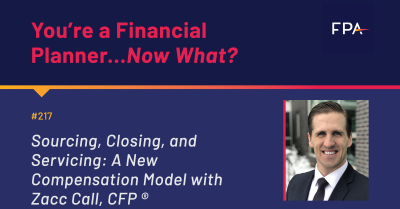
An unconventional start to financial planning
Financial planning wasn’t always Zacc’s first choice for a career; like many of us, he had to decide on a career in high school, and didn’t know the profession existed back then. Because he liked people, math, and design, he landed on architecture as a career path. He worked as a runner for an architectural firm, which involved hauling rolls of plans around to building owners and contractors and engineers and back again. “I feel old saying this because I’m sure that they do it now electronically,” Zacc quipped.
Zacc realized his job as a runner wasn’t cutting it, so he turned to a new industry, and interviewed at Fidelity.
“I loved people and numbers, and I feel like there’s a decent amount of design in financial strategy — you know, decision making with financial assets,” said Zacc. “So these three things came back together.”
After working various roles at Fidelity over eight years, Zacc landed “the dream job” that everyone wants to have: the financial planner in the branch. However, the job was not what he expected. The culture of competitiveness was not what he wanted.
A call from a friend who needed help with his business couldn’t have better timing. Zacc left Fidelity to work for Capita Financial Network with his friend Mike, where he’d eventually become a partner.
A new compensation model
One of Zacc’s experiences at Fidelity ended up shaping the current advisor compensation model at Capita. The focus was on bringing in new assets rather than building relationships with clients, which was a big shock to Zacc.
“It was much more focused on the money coming in versus the money going out,” said Zacc. “So you had this weird incentive to forget the people that had said yes to you, and just look for more people to say yes to you. And...it felt wrong and it felt weird.”
That’s why, with the help of a consultant, Capita created a new compensation structure that broke apart the fee revenue. Their structure is based upon three activities: who found the client (sourcing), who got the client to say yes to working with the firm (closing), and who is doing their financial planning servicing (servicing). The servicing has the most weight, but the other two activities receive some of the fee revenue, too.
Their compensation model is essential to the success of the firm, and it allows them to find advisors with specific skill sets. Capita’s ideal advisor is someone who has a passion for financial planning, but isn’t quite as interested in “pounding the pavement to try to find new clients,” as Zacc put it. These new advisors get to really shine because there’s less pressure to bring in the money.
Advice for new financial planners
How can new financial planners fresh out of a financial planning program make themselves attractive candidates to firms? It starts with understanding what you have to offer.
“If you get out there in enough chances, you’ll find that either people say yes to you, or they’re saying no to you,” said Zacc. “You cannot find out how good you are at communication or how charismatic you are until you’ve been in enough situations to see, and get that feedback loop of ‘yes’ or ‘no.’”
Another tip Zacc had for new planners: don’t be overly concerned about compensation. The financial planning industry is “absolutely set up for people to make a lot of money...you don’t want to get caught up too early on the numbers.”
What You’ll Learn:
- How Zacc entered the profession
- His roles at Fidelity
- A new compensation model at Capita
- Why their compensation model is essential for the firm
- How they use new advisors’ skills to the firm’s advantage
- Pushing for success in the first year
- What Zacc looks for in new financial planners
- Put yourself out there (and listen to feedback)
- Zacc’s advice for new planners
Show Notes:
In this episode of YAFPNW,
- We discuss Zacc’s work at Capita Financial Network
- The Financial Call podcast
- Interested in following Zacc? Follow Zacc on LinkedIn and on Twitter at @thefincall!